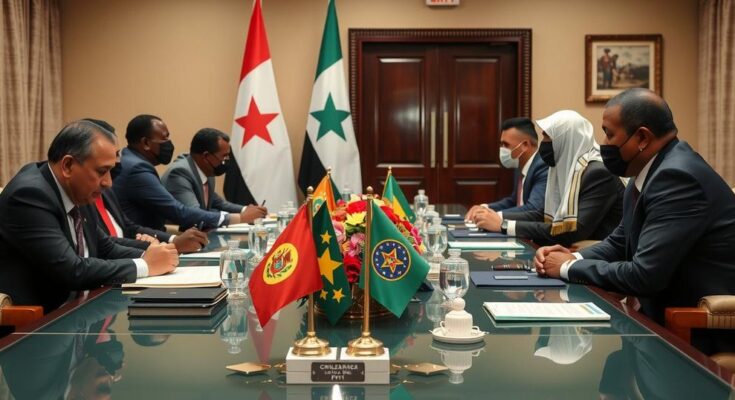Ethiopia seeks the replacement of Somalia’s Foreign Minister Ahmed Fiqi amid President Hassan Sheikh Mohamud’s visit to Ethiopia, where diplomatic ties were restored. Fiqi remains in Egypt discussing alliances with Eritrea. President Mohamud’s outreach may signal tension with federal member states like Puntland and Jubaland that align with Ethiopia, amidst ongoing geopolitical rivalries in the Horn of Africa.
Ethiopia is reportedly advocating for the removal of Somalia’s Foreign Minister Ahmed Fiqi, creating diplomatic tension as Somali President Hassan Sheikh Mohamud undertakes a visit to Ethiopia. During this visit, President Mohamud was warmly received by Prime Minister Abiy Ahmed, and the two leaders publicly announced the restoration of diplomatic relations between their nations. However, Foreign Minister Fiqi, who is currently engaged in talks in Egypt with Egyptian and Eritrean counterparts, was notably absent from the presidential delegation.
Amid the absence of Minister Fiqi, Somalia’s Minister of State for Foreign Affairs accompanied President Mohamud on his trip. It has been reported that Ali Balcad, a close advisor to the President, is now overseeing issues related to Ethiopia, thereby indicating a shift in diplomatic strategy. Observers have suggested that President Mohamud’s renewed engagement with Ethiopia might be an attempt to diminish ties with regional federal states such as Puntland and Jubaland, which have historically maintained strong relationships with Ethiopia.
Moreover, the dynamics of the regional geopolitical landscape are influenced by Ethiopia’s longstanding security collaborations with both Puntland and Jubaland, which serve as crucial buffers against militant threats near the border. Recent agreements have also seen the inclusion of Ethiopian troops in the restructured African Union peacekeeping force, further solidifying Ethiopia’s role within Somalia’s security framework.
On the other hand, Egypt’s resistance to the replacement of Minister Fiqi highlights the ongoing geopolitical competition in the Horn of Africa. The Egyptian government has bolstered its alliances with Somalia and Eritrea in an effort to balance against Ethiopia’s expanding influence. This rivalry is not new, as evidenced by the earlier ousting of former Somali intelligence chief Mahad Salad over perceived closeness to Egyptian interests. Observers are now considering if Minister Fiqi might encounter a similar outcome.
The management of Somalia’s foreign relations under President Mohamud’s administration has attracted criticism for its perceived lack of coherence and national strategic focus, suggesting a foreign policy potentially driven by personal interests. This vulnerability may allow for greater external influence over Somalia’s territorial integrity and political future. The ongoing competition between Ethiopia and Egypt reflects the fragile state of Somali politics within the broader rivalries in the Horn of Africa region.
The geopolitical dynamics in the Horn of Africa are marked by competing interests from regional powers, particularly Ethiopia and Egypt, both of which seek to extend their influence in Somalia. Relations between Somalia and its federal member states, notably Puntland and Jubaland, are complex due to shared borders and security concerns. Ethiopia has a history of significant involvement in Somalia’s security affairs, while Egypt’s strategic alliances aim to counterbalance Ethiopia’s growing regional power. The interplay of these relationships significantly affects Somali foreign policy and internal stability, raising questions about the vulnerabilities faced by the Somali government amid external pressures.
In summary, the ongoing tensions surrounding the proposed replacement of Somalia’s Foreign Minister by Ethiopia highlight the intricate geopolitical competition in the Horn of Africa. President Hassan Sheikh Mohamud’s diplomatic initiatives appear to be straining existing relationships with important regional actors, further complicating the already delicate balance of power in Somali governance. As both Ethiopia and Egypt vie for influence, the future of Somalia’s foreign policy continues to be an area of significant concern and scrutiny.
Original Source: www.garoweonline.com




